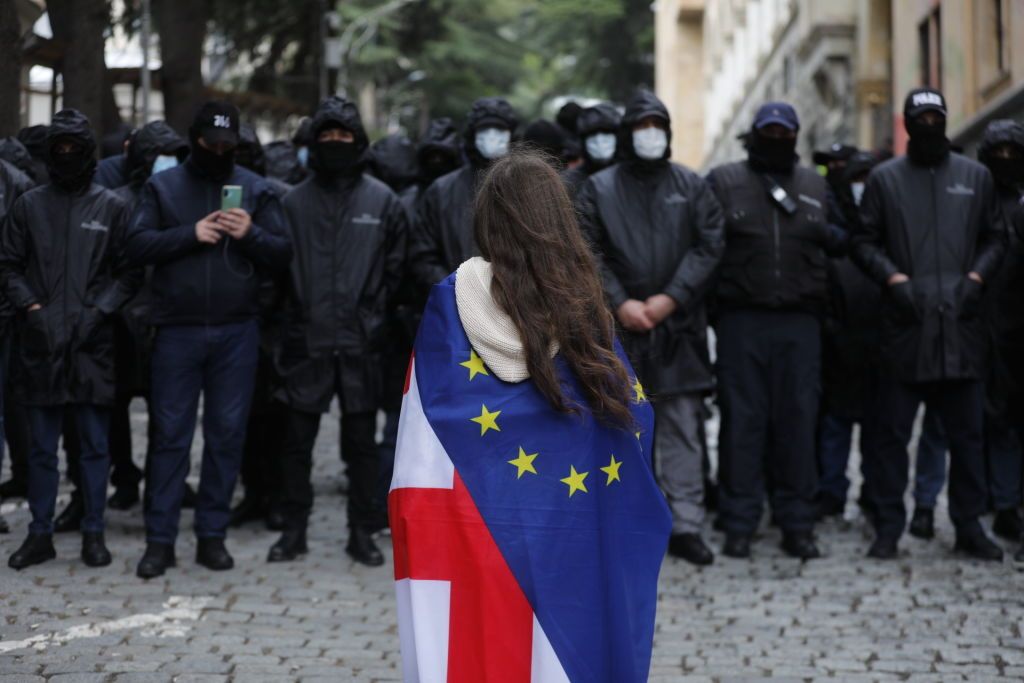The Counteroffensive: Some aren't evacuating from Ukraine's front-line towns. Why?
As Russia escalates attacks in northeastern Ukraine, some Ukrainians refuse to leave their front-line hometowns. Why?

A man says goodbye to a child sitting on an evacuation train at Kyiv's central station in Kyiv, Ukraine, on March 4, 2022. (Sergei Chuzavkov/AFP via Getty Images)

Oleh Tymoshenko
Reporting fellow at The Counteroffensive
Editor’s Note: This article was published by the twice-weekly newsletter “The Counteroffensive with Tim Mak” on May 30, 2024, and has been re-published by the Kyiv Independent with permission. To subscribe to "The Counteroffensive," click here.

Nataliia Kalinichenko treasures her newspaper archives, with clippings dating back to the 1940s, more than her own life. As Russia launched a new offensive in Ukraine's Kharkiv Oblast in early May, rockets struck just 300 meters from her newspaper office in neighboring Sumy Oblast. Despite the danger, Kalinichenko and her colleagues refused to abandon their town of Bilopillia. Instead, they prioritized evacuating the archive of historical newspapers.
Kalinichenko is one of fewer than 2,000 residents remaining in Bilopillia, which had a pre-war population of 16,500. While Russia's new offensive is focused on Kharkiv Oblast, uncertainty looms in neighboring Sumy Oblast, which has faced heavy attacks throughout the course of the full-scale war.
Ukrainian authorities have announced civilian evacuations in both Kharkiv and Sumy oblasts, from which around 20,000 people have been evacuated thus far. Despite the risks, many residents are reluctant to leave.
Kalinichenko is proud to have remained in her hometown, which lies just 10 kilometers from the border with Russia. She views staying as a mission of sorts. The editor-in-chief of the community's local newspaper, Bilopilshchyna, Kalinichenko has lived in Bilopillia her entire life. The newspaper will celebrate its 104th anniversary this year, with its first issue published in 1920 – it's the oldest printed publication in Sumy Oblast.
When the Ukraine Response Fund, a U.S. initiative addressing the humanitarian needs of Ukrainians, offered to evacuate Kalinichenko and her colleagues, she instead requested that their editorial archive be taken to safety.
“Let's just say that we have worked out a certain pattern,” Kalinichenko said. “Maybe it's a little bit stupid, a little bit dark… not in keeping with life, but it's already been practiced. And maybe it's some kind of mission...While you're here, you record everything, you see everything.”
Many of Kalinichenko's friends also choose not to evacuate, despite living in villages even closer to the Russian border.
"I called my friend and asked her: ‘Why aren't you leaving?’ And she said: ‘I sowed the garden, but I'm in trouble – a rocket fell on the garden. So now I don't sow half the garden because the rocket is sticking out of the ground and it hasn't been neutralized yet. So I don't go close, but sow everything in front of the rocket.’ That's how they live," Kalinichenko told The Counteroffensive, with a smile on her face.
It's mostly the elderly who refuse to evacuate, according to the head of the Bilopillia community, Yurii Zarko. They often argue that they were born here, this is their land, their parents and grandparents lived here, and so they will die here. Some people are also used to living off their farmland and don't want to try living elsewhere.

"If a person from a village who is used to having pigs, cows, etc. is moved somewhere else, he or she will not survive on a pension," Zarko said.
"It's psychologically painful for people to leave their homes – they cry, and some become hysterical,"according to Borys, a fixer and volunteer from Kharkiv who took part in the evacuations in Kharkiv Oblast.
It's not just about material losses, but also about people's emotional attachment to their homes. Another reason for people's reluctance is the fear of the unknown, explained Dmytro Myshenin, the head of the Angels of Salvation charity foundation, which has been involved in evacuations since 2022.
"People do not know where they are going and what awaits them. If you tell a person that they will go to a specific place and that they will be fed there, and that they will be safe and well off, then very often people agree to evacuate. These are the most decisive factors and the most convincing argument," Dmytro said.
Many people have lived their entire lives in a small town or village. For them, leaving is surprising, scary, and unpredictable. Volunteers' main task is to explain as much as possible to evacuees and address their fears, explained Yaroslav Kornienko, an evacuation coordinator with the East-SOS charity foundation.
Since the East-SOS charity foundation specializes in evacuating people with limited mobility, who often cannot care for themselves, this problem is even more urgent. These individuals are used to their environment – for example, having a neighbor who takes care of them or living in homes tailored to their needs. If they leave, they fear ending up in a completely different environment where they cannot live independently.
Their relatives often refuse to evacuate as well, fearing difficulties in finding suitable housing, transportation challenges, and struggles to find new jobs that would allow them to buy medicine and pay rent.
In Bilopillia, the closure of the local Ukrposhta post office is a big problem. People used to receive pensions, make utility payments, and send and receive parcels through the post office. Residents now have to do all of this themselves.
Some of Kalinichenko's friends have not only evacuated from but also returned to their hometowns, realizing they have their own house and land there, while in the city they "need to buy potatoes and carrots."
Kalinichenko's son and his family live in Sumy, which is farther from the Russian border and safer, but she hopes for a better situation in Bilopillia and has no plans to leave her beloved village."As long as there is us, as long as there are those who protect us, we live somehow," she said.
Editor’s Note: The opinions expressed in the op-ed section are those of the authors and do not purport to reflect the views of the Kyiv Independent.












